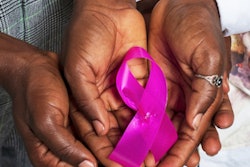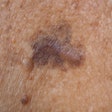
Chronic stress may impact treatment completion and survival outcomes for breast cancer patients, according to research presented at the American Association for Cancer Research's Conference on the Science of Cancer Health Disparities in Racial/Ethnic Minorities and the Medically Underserved.
In her presentation, Dr. Samilia Obeng-Gyasi from Ohio State University said her team found that elevated allostatic load -- the increased burden of chronic stress -- was linked to lower likelihood of completing chemotherapy and a lower overall survival rate in patients with lymph node-positive or high-risk lymph node-negative Human epidermal growth factor receptor 2 (HER2)-negative breast cancer.
"Prior studies have shown an association between high allostatic load and worse cancer survival," Obeng-Gyasi told AuntMinnie.com. "However, the results on the relationship between high allostatic load and chemotherapy completion were surprising and is something we will investigate some more."
Allostatic load describes physiologic changes secondary to stressful social and environmental factors, Obeng-Gyasi said. Examples of factors that have been shown to be associated with high allostatic load include childhood trauma, low socioeconomic status, stressful work environments, low education level, and race/ethnicity.
"Essentially, allostatic load allows us to understand how your living and working conditions can affect you on a physiologic level and how that can lead to illness," Obeng-Gyasi said. "The physiologic changes measured by allostatic load are postulated to occur through the stress pathway."
Previous studies suggest elevated allostatic load is linked to poor tumor prognostic features in Black breast cancer patients and worse disease-specific and overall survival among cancer patients. However, no studies have evaluated the relationship between genetic ancestry, allostatic load, and clinical trial endpoints such as chemotherapy completion or overall survival.
Prior evaluations also suggest African ancestry is associated with a worse invasive disease-free survival and lower odds of chemotherapy completion.
The team wanted to evaluate the association of genetic ancestry and allostatic load with trial completion per protocol and with overall survival among patients. The group looked at data from 348 patients enrolled in the ECOG-ACRIN E5103 phase III clinical trial. About 80% had European ancestry, 10% had African ancestry, and 10% had other ancestry.
The researchers found that patients of African ancestry and European ancestry had a higher average allostatic load score (2.1 and 1.88 respectively) compared with other ancestry patients (0.91), meaning more physiologic dysregulation.
On adjusted analysis, a one-unit increase in allostatic load was associated with a 15% reduction in the odds of completing chemotherapy per protocol (odds ratio, 0.85). Additionally, a one-unit increase in allostatic load was associated with a 14% increase in the hazard of death (hazard ratio, 1.14).
The team did not find any association between ancestry and chemotherapy completion or survival, and there was no interaction between allostatic load and ancestry.
Obeng-Gyasi told AuntMinnie.com that the team plans on examining allostatic load in other clinical trials and cancers to see if their results are consistent across different types of cancer.
"Also, we will be conducting further analysis to better define the relationship between allostatic and treatment completion," she said.



















